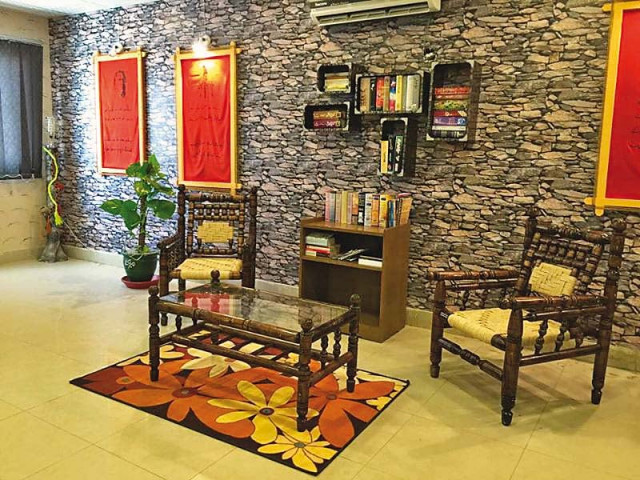Thinkers’ rendezvous: Café Khanabadosh hopes to revitalise café culture in Hyderabad
Head to the venue for your dose of politics, literature or healthy discourse.

The cafe, with its collection of literature and posters of revolutionary poets and writers, hopes to inspire healthy discourse among the young writers and scholars. PHOTOS: EXPRESS
Aimed to revive the cafe culture of the past, which is attributed to having paved the way for many social and political movement, the place hopes to match the T2F in Karachi and the Pak Tea House in Lahore.
"Societies that see collective dreams make progress. Sadly our Sindhi society has given up dreaming. So, this place is for such dreamers to rendezvous," avowed Amar Sindhu, a university teacher and rights activist, who conceived the idea of the cafe and materialised it too.
The formal inauguration ceremony held on Sunday night featured recitation of poetry, Shah jo raag, presented by the fakirs of Shah Abdul Latif Bhittai's shrine as well as other musical performances that lasted past midnight.
The cafe, located in the premises of the Sindh Museum and obtained on rent from the Sindh culture department, comprises a small hall with a public park stretching to its entrance. The seating arrangement is available both indoors and outdoors. It remains open from 11am to 11pm. Writers, poets and intellectuals are offered concessionary services.
The idea
"Several people have asked me why I chose the name Khanabadosh for the cafe," said Sindhu, briefing the audience at the ceremony about the concept of the cafe. "The Khanabadosh spend their lives travelling. Travelling is their destination. And when they leave one place after a stay, they also leave behind marks of their existence for others."
For her, the lives of artists, writers and activists are archetypal of the gypsies.

However, despite its conceptual reference, the cafe is devoid of a thematic aura. Inside the hall, a small wall-mounted book shelf contains collections of novelists and poets, such as Orhan Pamuk, James Joyce, Fyodor Dostoyevsky, Nafisa Haji, Forugh Farrokhzad, Faiz Ahmed Faiz, Jigar Muradabadi, Mir Anees and Mohsin Naqvi, among others. Also noticeably placed are Shah Jo Risalo and the works of Sachal Sarmast, Shah Sachal Sami, Baba Fareed and Bulleh Shah.
The photographs decorated on the walls of Maulana Rumi, Simone de Beauvoir, Najeed Mehfooz, Jean Paul Sartre, Edward Said, Shaikh Ayaz, Nizar Qabani, Amrita Pritam, Faiz and Arundhati Roy also provide some inspiration. Notwithstanding these features, the rest is much like an ordinary restaurant. Inside the hall, there are three designated sitting corners for writers, chess players and busybodies. Yes, the gossip making will have no holds barred.
Financial constraints
Arfana Mallah, her colleague in Sindh University and a comrade in activism, cited financial constraints as the reason for not being able to develop the ambiance further. They do plan to infuse the place with conceptual characteristics in the future. "This work is not profit-oriented. We just want to earn enough to ensure sustainability."
She claimed that some donor agencies offered them financial support as they began to put their idea into execution. "We turned down these offers to avoid being dictated by the donors' agenda."
While many, among over the hundred younger activists, who attended the event viewed the initiative optimistically, the senior citizens recalled how the cafes during their youth were launching pads for several movements. "Karachi Hotel, Cafe Jabees, Cafe George and Irani Hotel were among the places where we used to get the company of luminaries the likes of Ghulam Nabi Agro, Niaz Humayuni, Shaikh Ayaz, Ibrahim Joyo, Shaikh Ali Muhammad, Tanveer Abbasi, Agha Saleem, Rasool Bux Palijo and Jamal Abro," reminisced Qalandar Shah Lakyari, a retired professor of English literature.
He said that artists and writers live in a world of imagination and they yearn for the company of people with similar tastes. For him, the cafes were a perfect setting for those people to gather and discuss ideas and opinions.
"Literary, revolutionary and political movements in the world have often sparked from such settings," observed Dr Sahar Imdad Hussaini, a Sindhi writer.
Published in The Express Tribune, May 19th, 2015.



















COMMENTS
Comments are moderated and generally will be posted if they are on-topic and not abusive.
For more information, please see our Comments FAQ